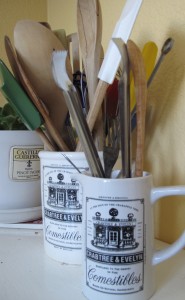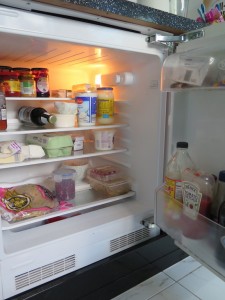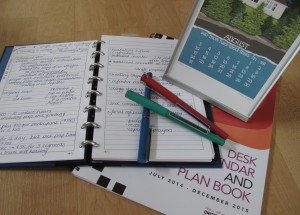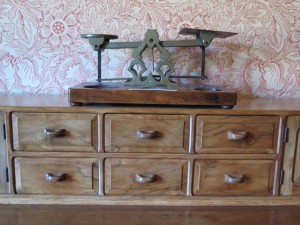 What are the material givens and ‘essentials’ of your life, the devices and possessions you take for granted? What is so common to your daily round that you would be startled to live a week, a month, six months, without it? What, for you, comprises ‘normal’? For what do you reach without thinking…and how does that shape the parameters of your choices and the use of your time?
What are the material givens and ‘essentials’ of your life, the devices and possessions you take for granted? What is so common to your daily round that you would be startled to live a week, a month, six months, without it? What, for you, comprises ‘normal’? For what do you reach without thinking…and how does that shape the parameters of your choices and the use of your time?
The first place we stayed on this sabbatical was the London flat of friends – a gracious and welcoming home where we have enjoyed their ‘hospitality in absentia’ before. It boasted a spiffy new top-of-the-line Bosch fridge-freezer which (for those of you who have never lived in an EU house) is about one–third the size of the relatively modest comparable appliance in our house in Colorado. And we were able to leave with clean clothing a week later, after using their (standard European sized) stacked washer-dryer which can wash (and then dry) a handful of clothes at the stately pace one associates with the Queen’s Rolls Royce carrying her to a funeral for a member of the Royal Family.
 From there, we drove to stay with friends who spent years in the States before moving to England. In the US, they developed more Americanized tastes and expectations. So, we enjoyed an amazing coffee maker that ground the beans and made a strong, long cup of coffee with the push of a button. We also got to wash our underwear in a large washing machine (meaning it handled seven sets of underwear and socks for each of us, and two of my husband’s shirts, and my pyjamas all in the same load), but they do not own a dryer. The cost of electricity in the EU is four or five times what it is in the States and dryers are power-hogs. Even when a household has one, they also have a clothesline and drying racks and most folks use those except in a prolonged period of wet weather.
From there, we drove to stay with friends who spent years in the States before moving to England. In the US, they developed more Americanized tastes and expectations. So, we enjoyed an amazing coffee maker that ground the beans and made a strong, long cup of coffee with the push of a button. We also got to wash our underwear in a large washing machine (meaning it handled seven sets of underwear and socks for each of us, and two of my husband’s shirts, and my pyjamas all in the same load), but they do not own a dryer. The cost of electricity in the EU is four or five times what it is in the States and dryers are power-hogs. Even when a household has one, they also have a clothesline and drying racks and most folks use those except in a prolonged period of wet weather.
After a week in two different B & Bs, we are now settled in Ireland for the next three weeks. The configuration of appliances has switched up again. For the third time, we have no microwave, no coffee maker (only a café presse), a fridge most Americans would associate with college students and a freezer of comparable size. We have a stacked washer-dryer ever-so-slightly larger than the one in London (and a clothesline and drying racks).
House exchanges would not be the preferred mode of travel for everyone, but (for us) they bring the challenging blessing of looking with fresh eyes at familiar expectations; they provide a gentle, inexorable push past the parameters of our unmindful daily existence. [This works both ways: our current exchangers confess they are in TV withdrawal (we are not hooked up to cable) and for them an evening reading a book is an unsettling experience, compounded by leaving a long-running series in ‘pause’ for three weeks!]
Grocery shopping in daily or every-other-day increments so that we can fit it all in the fridge is a change in our life pattern. Making coffee in a press and not being able to reheat it (no microwave) startles us into a different attentiveness. After the first cup, we ask ourselves, ‘Make more? Stop here?’ At home, I use up the insulated potful automatically. In the same way, I wash and dry clothes in a machine regardless of the weather. Although Colorado would be an ideal place to dry almost anything outside, our Home Owners’ Association doesn’t allow clotheslines. And (subsidized) energy is cheap in the US.
 In Colorado (as in every house for the past 30 years), we have a room that is solely an office. When I was writing and publishing as my (self-employed) work, it was a necessity. Now, it is the place I pay bills, write my blog, file papers, stay in touch with family and friends scattered across the globe, and keep two bookcases full of professional books (at least a half-dozen of which I reference in any given week). In our twenty-three house exchanges across 18 years, not a single house has had a dedicated office or study. Not one. I can only think of two (three?) that had a flat surface and a stash of simple office supplies with, maybe a rolling file drawer underneath), yet we have file drawers not only in the office, but in the basement (seven years of tax returns take up more than a little space!)
In Colorado (as in every house for the past 30 years), we have a room that is solely an office. When I was writing and publishing as my (self-employed) work, it was a necessity. Now, it is the place I pay bills, write my blog, file papers, stay in touch with family and friends scattered across the globe, and keep two bookcases full of professional books (at least a half-dozen of which I reference in any given week). In our twenty-three house exchanges across 18 years, not a single house has had a dedicated office or study. Not one. I can only think of two (three?) that had a flat surface and a stash of simple office supplies with, maybe a rolling file drawer underneath), yet we have file drawers not only in the office, but in the basement (seven years of tax returns take up more than a little space!)
As I have mentioned in a previous blog, shortly after we return to the States, we are going to engage with the process Marie Kondo lays out in The Life-Changing Magic of Tidying Up. We are planning on six months of intentional focus on the objects in our lives – what we will choose to keep and what we will choose to release. We are wondering what space (literal space) this will open in our home…and what space it will open in the pattern of our days. I don’t imagine we will give up our washer and dryer, or our coffee maker. But (so far, at least) I am happily living with one suitcase full of clothes for four months. So, how many of the clothes I left behind do I really need or want?
What do I truly value…and what do I own because it looked clever, or pretty, or helpful as I cruised through the store? What really deserves a place in my life (and my time to care for it) and what just sucks up energy (both electricity and my life force)? William Morris — who directly influenced many of the National Trust homes we visited in our first two weeks — said, “Have nothing in your house that you do not know to be useful, or believe to be beautiful.”
 I suspect that dictum works for lives, too. Releasing objects is also a process of releasing pathways of thought and patterns of behavior. What is both beautiful and useful in my spirit? in my mind? in my heart? What possessions actually inspire generosity, wisdom, compassion, joy? and which tempt me to greed, or self-indulgence, or fear, or stress?
I suspect that dictum works for lives, too. Releasing objects is also a process of releasing pathways of thought and patterns of behavior. What is both beautiful and useful in my spirit? in my mind? in my heart? What possessions actually inspire generosity, wisdom, compassion, joy? and which tempt me to greed, or self-indulgence, or fear, or stress?
Being shaped (however temporarily) by someone else’s decisions and values – whether conscious or unconscious – is a powerful gift. Having and not having are profound choices if we are mindful. I am trying to be mindful.
–Andrea
Text © 2015, Andrea La Sonde Anastos
Photos © 2014, 2015 Immram Chara, LLC